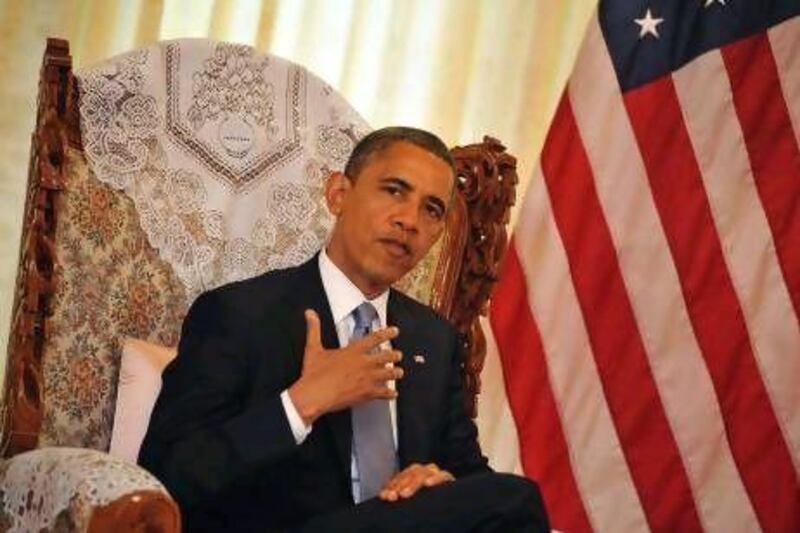NEW YORK // When Barack Obama was preparing for his first presidential inauguration in December 2008, Israel went to war with Hamas, battering the Gaza Strip with a bloody ground invasion and killing more than 1,400 Palestinians.
Four years later, Mr Obama is once more confronted with spiralling Middle East violence within weeks of winning an election, as bombs again lay waste to swathes of Gaza and Hamas rockets land in Israel.
But the deja vu only goes so far. The region and the US president's foreign policy priorities are starkly different now, and there is little chance that he will push for a grand bargain on Middle East peace as he did in 2009, analysts say.
In the short term, the US will work closely with Egypt and Israel in an attempt to prevent the violence from becoming a wider conflict, said Geoffrey Kemp, the director of regional security programmes at the Centre for the National Interest, a think tank based in Washington, DC.
A broader peace process, however, is "off the table until things calm down and until the Iranian and Syrian issues are resolved", Mr Kemp said.
While some voices will call on the president to use the current flare-up to push for a renewed peace process, the fact that Hamas rockets have fallen close to Israel's two largest cities will make any concessions by an already reticent leadership a political impossibility.
"The Israeli public will not be in the mood for negotiations that would lead to [Israel] withdrawing from territory," said Steven A Cook, a senior fellow for Middle Eastern studies at the Council on Foreign Relations. "So I think that anybody looking at this situation is saying that [the peace process] isn't going to be a priority for the president."
The US administration's Middle East priorities will centre on negotiating a deal with Iran over its nuclear programme, helping the Arab Spring states successfully transition to democracy and working to bring an end to the Syrian civil war, the analysts said.
Whatever the order of these priorities, Mr Obama is unlikely to change his so-called "light footprint" approach of diplomacy and tightly controlled military engagements, usually by small commando units or remote-controlled drones.
"I don't see any dramatic change" in focus or tactics," said Mr Cook.
The sex scandal involving David Petraeus, the former director of the CIA, has complicated Mr Obama's efforts to choose a new foreign policy team to replace his outgoing secretaries of state and defence, and now the CIA, but new faces are expected to have little effect on the tenor or direction of Middle East policy.
"The overall strategic [foreign policy] thrust over the past four years has been set by the White House," said Mr Cook. "And I don't think personnel is going to dramatically change that."
Where Mr Obama may be more assertive is with his biggest Middle East challenge - stopping Iran's military nuclear ambitions.
His strategy of crippling sanctions will probably remain but, while the president is still flush with political capital, the pressure is likely to be increased on Iran, said Trita Parsi, the president of the National Iranian American Council.
"He has an opportunity now to offer more to get a compromise, and I think he will try," said Mr Parsi. "But it's not clear if it will be enough."
Tehran wants the US to lift its devastating economic sanctions in exchange for an end to uranium enrichment, but Iranian leaders realise that a Republican-controlled House of Congress will make any gradual compromises extremely difficult.
"If Obama isn't capable of lifting sanctions, then what incentive do the Iranians have to change their [nuclear] policy?" asked Mr Parsi.
Congressional blocks will also make it more difficult to engage Tehran on the question of regime change in Syria, Iran's close ally.
"There's a realisation that the Iranians want to talk about Syria, but there won't be this conversation unless there is a bilateral one between the US and Iran, and so far, the Iranians have not agreed to it," said Mr Parsi.
A pre-emptive military assault on Iran is not expected to be seriously considered by the next administration as it shifts its foreign policy focus to east Asia, where it believes the country's long-term strategic and economic interests lie.
This change has been highlighted Mr Obama's leading diplomats making trips to the region days after his re-election and his own visit this week to south-east Asia.
The shift is part of a broader "post-post-Cold War" realisation by Mr Obama that, after a decade of war, military solutions to political challenges are ultimately unpopular and counterproductive, said Sarah Chayes, an assistant to the chairman of the Joint Chiefs of Staff in the first Obama administration.
"We're in an increasingly multipolar world now and that means that US leaders need to think more about how to have influence than how to have control, and influence may best be attained through a wide variety of non-military instruments," she added.
"In the initial post-Cold War era, America realised it could use its military instruments, which it couldn't before because the potential consequences could be apocalyptic," said Ms Chayes, who is now a senior associate with the Carnegie Endowment for International Peace.
"In the 20 years since then, there was an overuse of them and I think we might be coming to the end of that era."
But the Middle East has a way of pulling the US back in. With a weak economy in Europe and a still-struggling US, any major conflict could spook the oil markets to disastrous economic effect, said Mr Kemp.
"You can decide you're going to pivot to Asia, but the world gets a vote," added Ms Chayes. "It's what you might call strategic surprise - and it's very powerful."





